Designers of last year’s Marvel’s Spider-Man 2 used the processing power of the PlayStation 5 so Peter Parker’s outfits would be rendered with realistic textures and skyscraper windows could reflect rays of sunlight.
That level of detail did not come cheap.
Insomniac Games, which is owned by Sony, spent about $300 million to develop Spider-Man 2, according to leaked documents, more than triple the budget of the first game in the series, which was released five years earlier. Chasing Hollywood realism requires Hollywood budgets, and even though Spider-Man 2 sold more than 11 million copies, several members of Insomniac lost their jobs when Sony announced 900 layoffs in February.
Cinematic games are getting so expensive and time-consuming to make that the video game industry has started to acknowledge that investing in graphics is providing diminished financial returns.
It was clear this year, however, that the live service strategy carries its own risks. Warner Bros. Discovery took a $200 million loss on Suicide Squad: Kill the Justice League, according to Bloomberg. Sony closed the studio behind Concord, its attempt to compete with team-based shooters like Overwatch and Apex Legends, one month after the game released to a minuscule player base.
“We have a market that has been in growth mode for decades,” Ball said. “Now we are in a mature market where instead of making bets on growth, companies need to try and steal shares from each other.”
Ismail is worried that major studios are in a tight spot where traditional games have become too expensive but live service games have become too risky. He pointed to recent games that had both jaw-dropping realism — Avatar: Frontiers of Pandora (individual pebbles of gravel cast shadows) and Senua’s Saga: Hellblade II (rays of sunlight flicker through the trees) — and lackluster sales.



It’s also far easier to reliably create at scale. It’s relatively easy, with enough money and experience, to create art and programming teams that each make their own horse testicle textures, but how do you compartmentalize the creation of fun?